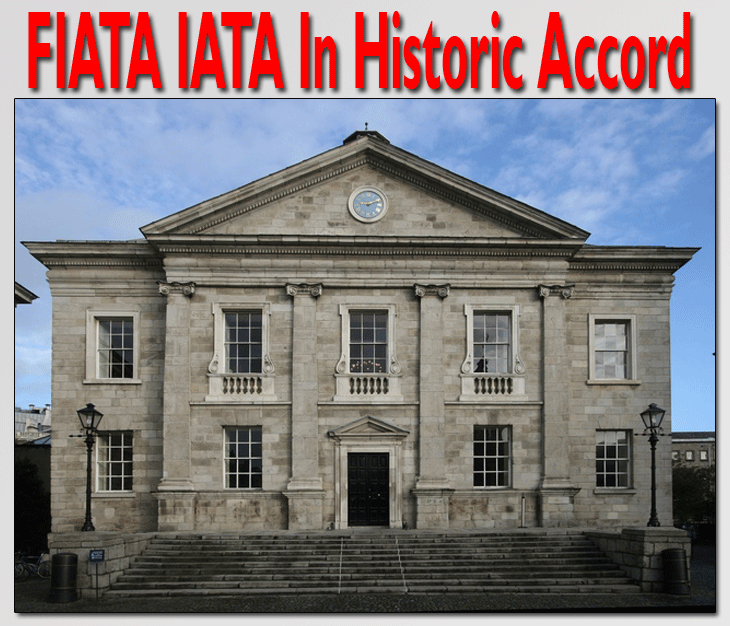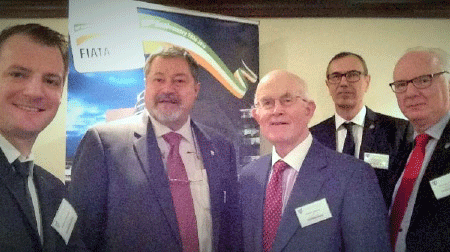
On
May 31, 1926, 15 freight forwarder associations
met in Vienna, Austria, to form FIATA. In 2016,
FIATA is the largest freight forwarder organization
in the world.
This week conferees
gather in Dublin, Ireland, for the Annual FIATA
World Congress to celebrate 90 years of FIATA. Founding
member companies will be presented Founding Members
Certificates at a special gala event that includes
a grand reception at the beautiful, 18th century
Trinity Dining Hall on the campus of Trinity College. |
 A Really Big Show—On Friday, October 7, at
the Congress, IATA and FIATA will sign an historic pact
that will usher
in a new era of closer cooperation between two major
forces in air cargo. A Really Big Show—On Friday, October 7, at
the Congress, IATA and FIATA will sign an historic pact
that will usher
in a new era of closer cooperation between two major
forces in air cargo.
The Congress is
hosted by The Irish International
Freight Association( IIFA), the sole representative
body and official voice of freight forwarding in Ireland.
IFFA was originally established at a meeting
held on March 14, 1962, with an attendance of just thirteen
forwarders. In 2016 IIFA has grown to include 110 full
trading members that employ more than 3,000 people and
handle more than 90 percent of Ireland’s €148
billion international merchandise trade.
Members
of the Irish International Freight Association brief
FIATA Director General Marco Sorgetti (second from left),
also in the picture from left are Seamus Kavanagh, Paddy
Kenny, William Cress, and Tom Thornton.
Here Rodolfo Sagel,
Chairman of the FIATA Airfreight Institute, offers a
brief overview of FIATA in modern times:
Today’s
international trade demands the traded goods arrive
just in time—safely, securely, in an increasingly
sustainable manner, and, more than ever, at reasonable
costs.
Economic factors are
not just keywords; they set the new ‘norm’
throughout the logistics industry, so the air freight
industry must learn how to address these changes in
a landscape of increasing competition with other modes
of transport.
Shippers
Take The Heat
Shippers
have been under pressure to cut distribution costs.
However, airfreight remains
indispensable and is the best choice—if not always
the cheapest solution—of transport for higher
values and smaller quantities.
Sensitive cargo also
prefers the air.
As the air cargo industry
increases its importance, so does the need for skilled
freight forwarders able to cope with the high pressures
of delivering goods in a customer oriented or customized
manner.
Freight forwarders thrive
at skillfully answering their clients’ needs and
consistently delivering the best combination of price
and quality.
Forward
To Some Important Points
Today,
thanks to a more efficient routing network and logistics
instruments, the exporter’s goods may become more
competitive in new markets.
Freight forwarders offer
a large variety of value-added services, as contained
in the description of services published on the FIATA
website. This has been an evolution of many years.
Now an increasing need
to deal with the complexity of more and more stringent
safety and security requirements adds another layer
to this complex, years-long evolution.
Forwarders meet these
challenges through the use of contemporary methodologies,
techniques, and precious know-how.
The forwarder serves
the global trade by procuring added value, which goes
far wider than only arranging for international transportation
and Customs.
The forwarder has become
in recent years the main facilitator of international
trade and is thus placed at the heart of international
trade of goods.
After
The Fall
Since
the 2008 financial crisis, the air cargo industry has
been stagnant and has experienced very little, if any
growth.
FIATA takes the view
that newer avenues of collaboration must be explored
and both freight forwarders and airlines must become
more forward thinking in their collaboration.
We need to make the right
investments in technology, especially in the development
of eCommerce tools, and adopt less cumbersome and less
costly modus operandi.
There still is too much
bureaucracy and paper surrounding the air cargo supply
chain.
Tip
Of The Hat From IATA
In 2013,
the International Air Transport Association (IATA) acknowledged
freight forwarders’ functional change and recognized
that they are an integral part of a sector that successfully
transports goods worth $5.3 trillion every year.
IATA understands the
importance of working with FIATA to achieve greater
efficiency for all partners in this crucial business.
The then-IATA Director
General Mr. Tony Tyler alluded to the critical role
that freight forwarding plays within the air cargo industry
when he spoke at the 2013 FIATA World Congress in Singapore.
Many of FIATA’s
practitioners do not utilize only air transport, as
FIATA is well represented in all modes, but it is unquestionable
that airfreight is paramount in the development of the
international trade. Mr. Tyler’s message intelligently
explored all the areas that are susceptible to producing
greater efficiencies in the industry, increased savings,
and a more effective approach to security and facilitation.
He identified the opportunity
of enhanced collaboration with FIATA as an element that
could be crucial to the success of both organizations.
Inter alia, Mr. Tyler
stated:
“That’s our
common case for working together to deliver fundamental
changes that will protect air cargo’s value proposition
to its customers. Instead of talking about how we divide
the pie amongst ourselves, we need to focus on how we
can best grow the size of the pie together. I am here
today to reassure you of IATA’s commitment to
work in partnership to deliver the solutions that will
secure the future for air cargo.”
Who
We Are Today & Tomorrow
FIATA
consists of small, medium, and big freight forwarding
companies in an increasingly competitive market.
Focusing on efficiency
and win-win situations for all involved business partners
goes in line with reasonable investments that both forwarders
and airlines are called to make in the near future,
inter alia in the area of paperless trade.
Today the air cargo supply
chain is so interconnected that no single party has
the resources to expand autonomously.
This is just a fact of
life and all must learn to live with it.
The importance of the
air freight sector is constantly monitored by FIATA.
FIATA’s Air Freight Institute (AFI) has developed
ongoing relationships with an exceptional number of
stakeholders in the air transport industry, from non-governmental
organizations, special interest groups, government bodies,
regulators, carriers, shippers, consignors, customs
groups, legal specialists, cargo risk underwriters,
and technology providers.
It is a complex galaxy
of interests where FIATA has a crucial role and never
sits idly.
From this position it
can greatly contribute to the improvement of air cargo
throughout the world and it does do so gladly and effectively.
FIATA also works closely
with other air cargo industry interests and is part
of GACAG, which will be led by FIATA in 2017-2018.
GACAG is advocating on
behalf of air cargo, in global air cargo security, e-commerce,
customs and trade facilitation, and the sustainability
of the air cargo industry.
On top of FIATA’s
advocacy efforts, we also deliver a dangerous goods
by air training program in cooperation with the International
Civil Aviation Organization (ICAO).
FIATA, alongside ICAO,
strongly believe in the benefits of training as a means
to ensure a sustainable and secure industry future.
This is but one of the initiatives in training, which
is traditionally one of the strongholds for FIATA.
Better
Relations Grow Business
Our
constituents strongly believe that the relationship between
airlines and freight forwarders is crucial for trade.
The efficient delivery
of airfreight services is unavailable without a well-functioning
relationship between airlines and freight forwarders.
This is, however in need
of profound changes, which are felt by all FIATA members
and a number of airlines.
This was the reason FIATA
and IATA had worked for more than four year’s on
the air cargo modernization program. The spirit of that
endeavor was supported by Tony Tyler’s words in
Singapore:
“We need a modernized
relationship that helps build trust and treats the Forwarder-Airline
relationship as a partnership of equals.
 “That will lead to the enhanced cooperation that
will help industry adapt to the momentous changes it faces.
“That will lead to the enhanced cooperation that
will help industry adapt to the momentous changes it faces.
“This is a modernization
path with many facets, where technology will also play
an important part.”
On July 18, 2016, I announced
the completion of the program agreement with these words:
“The Cargo Agency
Program has long needed updating. I am really pleased
that FIATA and IATA have joined forces to provide our
industry with a new, modern program and a framework for
operation that benefits both airlines and freight forwarders.
IFACP will eliminate unnecessary administrative procedures
and costs as well as free up valuable resources to tackle
the complex challenges that today’s global trade
presents. These include regulatory compliance, safety
and security, and the introduction of new technologies.
This agreement paves the way for a more successful future
for the fastest and most fascinating mode of international
transport.”
I maintain that this says
it all.
Rodolfo
Sagel
Chairman
FIATA Airfreight Institute
|




 “That will lead to the enhanced cooperation that
will help industry adapt to the momentous changes it faces.
“That will lead to the enhanced cooperation that
will help industry adapt to the momentous changes it faces. Vol.
15 No. 73
Vol.
15 No. 73 Vol.
15 No. 74
Vol.
15 No. 74